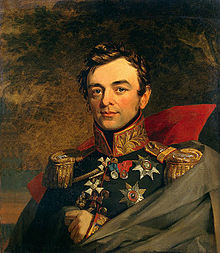- Ivan Paskevich
-
Ivan Fyodorovich Paskevich (Russian: Иван Фёдорович Паскевич) (8 May [O.S. 19 May] 1782 – 1 February [O.S. 20 January] 1856) was a Ukrainian-born military leader. For his victories, he was made Count of Erivan in 1828 and Namestnik of the Kingdom of Poland in 1831. He attained the rank of field marshal in the Russian army, and later in the Prussian and Austrian armies.
Biography
Born in Poltava on 19 May 1782, to a well-known family of the Ukrainian Cossack gentry, he was educated at the imperial institution for pages, where his progress was rapid, and in 1800 received his commission in the Guards and was named aide-de-camp to the tsar. His first active service was in 1805, in the auxiliary army sent to the assistance of Austria against France, when he took part in the Battle of Austerlitz, 20 December 1805, where Austrian – Russian troops were defeated by the French under Napoleon.
From 1807 to 1812, Ivan Paskevich was engaged in the campaigns against Turkey, and distinguished himself by many brilliant and daring exploits, being made a general officer in his thirtieth year. During the war with France in 1812–1814 he was present, in command of the 26th division of infantry, at all the most important engagements, and he won promotion to the rank of lieutenant general.
On the outbreak of war with Persia in 1826 he was appointed second in command, and, succeeding in the following year to the chief command,[1] gained rapid and brilliant successes which compelled the shah to sue for peace in February 1828. In reward of his services he was created Count of Erivan and received a million rubles and a diamond-mounted sword. From Persia he was sent again to Turkey, and, having captured in rapid succession the principal fortresses, he was at the end of the campaign made a Field Marshal at the age of forty-seven. In 1830, he was engaged in the Caucasian War on the territory of present-day Dagestan.
In June 1831, after the death of Field Marshal von Diebitsch, commander of Russian troops in Congress Poland, Paskevich was appointed his successor in crushing the Polish uprising. His armies, following the decisive success of Diebitsch at the Battle of Ostrołęka in May, advanced slowly but Paskevich redeemed his reputation at the Battle of Warsaw, giving a death blow to the Polish hopes of restoring independence. He was created Prince of Warsaw and awarded the office of namestnik of the Kingdom of Poland. With the kingdom's autonomy limited by the Statute, the period under Namestnik Paskevich – known in Poland as "Paskevich Night" – became infamous for political and economic repressions, as well as Russification.
On the outbreak of the Hungarian Revolution of 1848 he was appointed to the command of the Russian troops sent to the aid of Austria, and finally compelled the Hungarians' surrender at Világos.
In 1854 Paskevich took command of the Army of the Danube, which was then engaging the Turks in the initial stage of the conflict which evolved into the Crimean War. Although he laid siege to Silistria, Paskevich advocated aborting the campaign due to Austria's threat to intervene in the war. On June 9 he suffered a combat injury and was compelled to return to Russia, handing command of the army to General Mikhail Dmitrievich Gorchakov. Paskevich died in Warsaw, where in 1870 a memorial was erected to him in front of the Koniecpolski Palace. His remains were reburied by his son in the family mausoleum on the grounds of the Homel Palace.
References
- ^ John F. Baddeley, The Russian Conquest of the Caucasus (New York: Russell & Russell, 1969), p. 160.
 This article incorporates text from a publication now in the public domain: Chisholm, Hugh, ed (1911). Encyclopædia Britannica (11th ed.). Cambridge University Press.
This article incorporates text from a publication now in the public domain: Chisholm, Hugh, ed (1911). Encyclopædia Britannica (11th ed.). Cambridge University Press. Namiestnik of the Kingdom of Poland
Namiestnik of the Kingdom of PolandNamestniks Zajączek • Paskevich • Gorchakov • Sukhozanet • Lambert • von Lüders • Konstantin Nikolayevich • von BergCategories:- 1782 births
- 1856 deaths
- People from Poltava
- People of the Revolutions of 1848
- Field Marshals of Russia
- Russian nobility
- Russian commanders of the Napoleonic Wars
- Members of the State Council of the Russian Empire
- Namestniks of the Kingdom of Poland
- Russian people of the Polish–Russian War (1830–1831)
- Recipients of the Order of Saint George I Class
- Recipients of the Order of Saint George II Class
- Recipients of the Order of Saint George III Class
- Recipients of the Order of St. Andrew
- Recipients of the Order of the White Eagle (Congress Poland)
- Knights Grand Cross of the Military William Order
Wikimedia Foundation. 2010.


